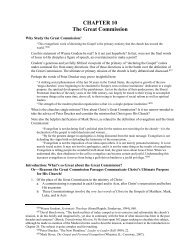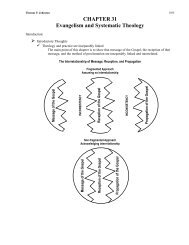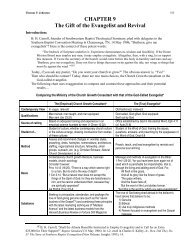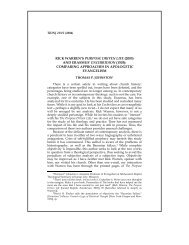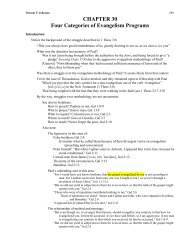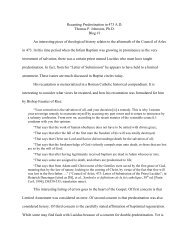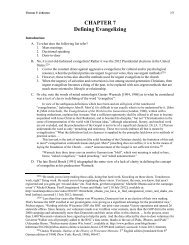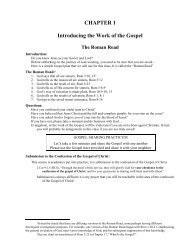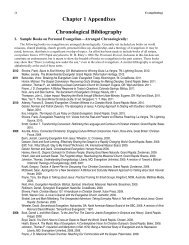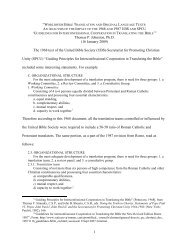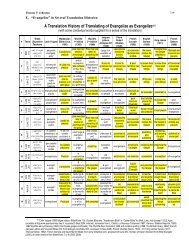Motivations and Urgency of Evangelism - Evangelism Unlimited
Motivations and Urgency of Evangelism - Evangelism Unlimited
Motivations and Urgency of Evangelism - Evangelism Unlimited
Create successful ePaper yourself
Turn your PDF publications into a flip-book with our unique Google optimized e-Paper software.
Thomas P. Johnston 191<br />
2) Rev 5:12, “Lamb that was slain”<br />
3) Rev 7:14, “the blood <strong>of</strong> the Lamb”<br />
4) Rev 12:11, “the blood <strong>of</strong> the Lamb”<br />
5) Rev 13:8, “the Lamb slain from the foundation <strong>of</strong> the world”<br />
iii. Other references to the atonement:<br />
1) Rev 5:9, “Worthy art Thou to take the book, <strong>and</strong> to break its seals; for Thou wast slain, <strong>and</strong> didst<br />
purchase for God with Thy blood men from every tribe <strong>and</strong> tongue <strong>and</strong> people <strong>and</strong> nation”<br />
2) Rev 7:14, “they have washed their robes <strong>and</strong> made them white in the blood <strong>of</strong> the Lamb”<br />
3) Rev 12:11, “they overcame him because <strong>of</strong> the blood <strong>of</strong> the Lamb…”<br />
4) Rev 19:13, “And He is clothed with a robe dipped in blood”<br />
d. The angel goes forth “to evangelize an eternal Gospel to all those who live on the earth”<br />
Rev 14:6<br />
10. The Gospel is the primary message <strong>of</strong> the church in the pastoral epistles (see Appendix to Chapter<br />
26):<br />
a. “Remember Jesus Christ,” 2 Tim 2:8<br />
11. Christ as the Lamb <strong>of</strong> God was in the mind <strong>of</strong> God before He created the world, 1 Pet 1:20;<br />
Rev 13:8; <strong>and</strong> Christ as the Passover Lamb is one <strong>of</strong> the main elements <strong>of</strong> the Pentateuch’s prophecy<br />
regarding the first coming <strong>of</strong> Jesus Christ<br />
12. It is difficult to doubt that the Gospel (the cross, justification by faith, salvation in Christ, believing<br />
in Christ) is the CIM <strong>of</strong> the NT church from a plain reading <strong>of</strong> the text:<br />
a. While seeking to avoid endless debates over hermeneutics, I am advocating a plain reading <strong>of</strong><br />
the text, rather than a theologically-forced reading<br />
b. For example, some who advocate a forced reading are those who adhere to:<br />
i. “Oneness Theology”—baptism in the name <strong>of</strong> “Jesus only” (modalistic monarchianism)<br />
ii. Assured healing <strong>of</strong> the sick by the prayer <strong>of</strong> faith<br />
iii. Finding the Virgin Mary <strong>and</strong>/or the Eucharist on every page in Scripture.<br />
Reasoning for the Glory <strong>of</strong> God as CIM:<br />
1. It is interesting to note, by way <strong>of</strong> introduction, that Calvin likewise accused the Schoolmen<br />
(Theologiens Sorboniques) <strong>of</strong> misappropriately emphasizing God over Jesus Christ: 174<br />
a. Calvin acknowledged that by the Holy Spirit man must seek Christ for salvation in order to find<br />
God175 b. But then Calvin appears to have fallen prey to the same framing <strong>of</strong> the question, using:<br />
i. Medieval categories <strong>and</strong> logical progressions<br />
ii. Quoting Augustine, whose quotations fill the pages <strong>of</strong> Rome’s quintessential Schoolmen,<br />
Peter the Lombard176 <strong>and</strong> Thomas Aquinas<br />
174 “This evil, therefore, must, like innumerable others, be attributed to the Schoolmen [theologiens<br />
Sorboniques], who have in a manner drawn a veil over Christ, to whom, if our eye is not directly turned, we must<br />
always w<strong>and</strong>er through many labyrinths” (John Calvin, Institutes <strong>of</strong> the Christian Religion, Henry Beveridge, trans.<br />
[available at: http://www.ccel.org/ccel/calvin/institutes.html (online); accessed: 16 Sept 2007; Internet], 470).<br />
175 “It is true, indeed, that faith has respect to God only; but to this we should add, that it acknowledges Jesus<br />
Christ whom he has sent. God would remain far <strong>of</strong>f, concealed from us, were we not irradiated by the brightness <strong>of</strong><br />
Christ. All that the Father had, he deposited with his only begotten Son, in order that he might manifest himself in him,<br />
<strong>and</strong> thus by the communication <strong>of</strong> blessings express the true image <strong>of</strong> his glory. Since, as has been said, we must be led<br />
by the Spirit, <strong>and</strong> thus stimulated to seek Christ, so must we also remember that the invisible Father is to be sought<br />
nowhere but in this image” (ibid., 470).<br />
176 Notice the Master <strong>of</strong> the Sentences, Peter the Lombard’s use <strong>of</strong> Augustine from the very beginning <strong>of</strong> Book<br />
One, “On the Unity <strong>and</strong> Trinity <strong>of</strong> God”; Distinction One; Chapter One, “Every doctrine concerns things <strong>and</strong>/or signs”:<br />
“While considering the contents <strong>of</strong> the Old <strong>and</strong> New Law again <strong>and</strong> again by diligent chase [‘indagine’], the prevenient<br />
grace <strong>of</strong> God has hinted to us, that a treatise on the Sacred Page is [‘versari’] chiefly about things <strong>and</strong>/or signs. For as<br />
Augustine, the egregious Doctor, says in the book on Christian Doctrine [‘Chapter 2, n. 2; here <strong>and</strong> in the next passage,<br />
but with many words omitted by Master (Peter) <strong>and</strong> not a few added or changed’]: « Every doctrine is <strong>of</strong> things, <strong>and</strong>/or<br />
signs. But even things are learned through signs. But here (those) are properly named things, which are not employed to



